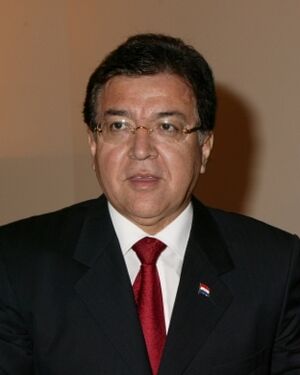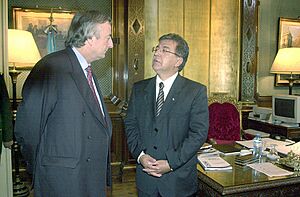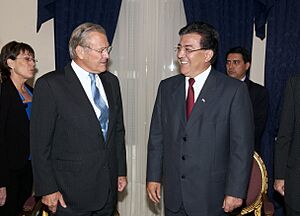Nicanor Duarte facts for kids
Quick facts for kids
Nicanor Duarte
|
|
|---|---|

Duarte in 2006
|
|
| 47th President of Paraguay | |
| In office 15 August 2003 – 15 August 2008 |
|
| Vice President | Luis Castiglioni Francisco Oviedo |
| Preceded by | Luis González Macchi |
| Succeeded by | Fernando Lugo |
| Paraguayan Director of the Yacyretá Dam | |
| Assumed office 15 August 2018 |
|
| Preceded by | Ángel María Recalde |
| Paraguayan Ambassador to Argentina | |
| In office 25 October 2013 – 4 January 2016 |
|
| President | Horacio Cartes |
| Preceded by | Gabriel Enciso López |
| Succeeded by | Federico González |
| President of the Colorado Party | |
| In office 15 May 2001 – 14 August 2003 |
|
| Preceded by | Bader Rachid Lichi |
| Succeeded by | José Alberto Alderete |
| Minister of Education and Culture | |
| In office 30 March 1999 – 29 January 2001 |
|
| President | Luis González Macchi |
| Preceded by | Celsa Bareiro de Soto |
| Succeeded by | Darío Zárate Arellano |
| In office 15 August 1993 – 13 February 1997 |
|
| President | Juan Carlos Wasmosy |
| Preceded by | Horacio Galeano Perrone |
| Succeeded by | Vicente Sarubbi |
| Personal details | |
| Born |
Óscar Nicanor Duarte Frutos
11 October 1956 Coronel Oviedo, Paraguay |
| Political party | Colorado Party |
| Spouse |
Gloria Penayo
(m. 1984) |
| Children | 6 |
| Alma mater | Universidad Católica de Asunción Universidad Nacional de Asunción |
| Occupation |
|
| Signature |  |
| Nickname | El tendota |
Óscar Nicanor Duarte Frutos (born 11 October 1956) is a Paraguayan lawyer, journalist, and politician. He served as the 47th President of Paraguay from 2003 to 2008. As a member of the Colorado Party, he became a very important person in Paraguayan politics during his time as president.
Duarte was born into a family with not much money in the countryside. He studied law and later became a journalist. He worked as a radio sports commentator and wrote for newspapers. In the 1990s, he started his political career. He worked in the government for Presidents Juan Carlos Wasmosy and Luis González Macchi, both times as the Minister of Education. Duarte became a close friend and supporter of the Colorado Party politician Luis María Argaña. After Argaña's death in 1999, Duarte took over his political influence.
Duarte was elected president in 2003. He won with 37% of the votes because the other political groups were split. When he became president, he was 46 years old, making him one of Paraguay's youngest presidents. He was also the first president who was not Catholic, as he had converted to Protestantism.
During Duarte's time as president, Paraguay's economy grew. He also became friends with Venezuelan President Hugo Chávez. Duarte wanted to change the constitution so he could run for president again. Many people in Paraguay thought this made him seem too powerful. This was one reason why his chosen successor, Blanca Ovelar, lost the election in 2008.
After leaving office, Duarte was elected as a senator in 2008, but the Senate did not allow him to take his seat. This happened again in 2018. From 2013 to 2016, he served as the Ambassador to Argentina. Later, he was put in charge of the Yacyretá Dam. Like all former presidents, Duarte has the special title of Senator for life, which is an honorary role without voting power.
Contents
Early Life and Career
Family Background
Óscar Nicanor Duarte Frutos was born on 11 October 1956 in Coronel Oviedo, Caaguazú. His family lived in the countryside and had mixed heritage. His father, Héctor Roque Duarte, was a police officer and songwriter. He fought for the Colorado Party in the Paraguayan Civil War of 1947. His mother, Disnarda Antonia Frutos, was a teacher.
Nicanor started working at sawmills when he was eleven years old, while also going to school. When he was fourteen, he joined the Colorado Party. At that time, it was almost required to join the party because of the government in power.
Education and Early Work
In the 1970s, Duarte moved to Asunción, the capital city. There, he studied law and journalism. He became a sports commentator for a radio station in Caaguazú. In the early 1980s, he started working as a writer for the newspaper Última Hora.
At this time, Duarte did not have much money. He lived in a small apartment and owned very few things. In 1984, he earned a law degree from the Catholic University of Asuncion. In 1989, he received a higher degree from the National University of Asuncion.
Family Life
In the 1970s, Nicanor Duarte began dating María Gloria Penayo Solaeche. They got married in 1984. They have six children: José, Héctor, María, Martín, Santiago, and Facundo. María Gloria is a member of a Mennonite church, and Duarte decided to join her faith.
Start of Political Career
After Alfredo Stroessner's government ended in 1989, Duarte became more involved in politics. He started to rise in the Colorado Party during the 1990s. He became the Vice Minister of Education during the government of President Rodríguez. Later, President Juan Carlos Wasmosy appointed him as the Minister of Education in 1993.
Duarte did not support army general Lino Oviedo, who tried to take power from President Wasmosy in 1996. Because he opposed Oviedo, Duarte became closer to Oviedo's main rival, Luis María Argaña. Argaña led his own group within the Colorado Party. In 1997, Duarte left his job as Minister of Education to run for office with Argaña. Argaña was trying to become the Colorado Party's candidate for president in the 1998 election. To bring the party together, Argaña became the running mate for Raúl Cubas, who was supported by Oviedo. Cubas won the election.
In March 1999, Vice President Argaña died. This caused a lot of anger and fear of another attempt to take power by force. Large protests happened, and eventually, President Cubas resigned. Luis González Macchi, who was part of Argaña's group, became president. He quickly appointed Duarte back to the Ministry of Education. Duarte then took over Argaña's political influence and became his successor. In 2001, he left his role as Education Minister to become the president of the Colorado Party.
Presidential Election in 2003
Colorado Party Primary
On 22 December 2002, Duarte won the Colorado Party's vote to become their candidate for president in the 2003 general election. He won against Osvaldo Domínguez Dibb, a rich businessman who was famous for being the president of the Club Olimpia football team.
General Election Victory
On 27 April 2003, Duarte won the presidential election. He received 37.1% of the votes. He won against Julio César "Yoyito" Franco (24%), Pedro Fadul (21.3%), and Guillermo Sánchez (13.5%). The fact that the other political groups were split into three main parts helped Duarte win the election.
Presidency (2003–2008)
Nicanor Duarte's government followed policies that were a bit more left-leaning than what the Colorado Party had done in the past. He spoke out against completely free trade and tried to build stronger relationships with other Latin American countries that had left-leaning governments. During his time as president, the Paraguayan economy grew.
After the Presidency
Duarte Frutos was elected as an active, voting Senator two times after being president. However, Paraguayan law says that former presidents can only be senador vitalicio (senator for life), which is an honorary title without voting power.
Duarte first announced he would resign as president on 1 July 2008, so he could become a Senator. He officially resigned on 23 June 2008. However, many members of the Paraguayan Congress from both the opposition and the government decided not to attend the special meeting where his resignation would be accepted. They argued that it would be against the constitution for him to become an active senator.
Because not enough members showed up, the Congress could not accept his resignation. This meant Duarte had to finish his term as president until 15 August 2008. He could not become an elected senator and instead became a non-voting senator for life, as is the rule for former presidents.
In 2018, Duarte Frutos and the outgoing President Horacio Cartes were both elected as senators. This again caused debate because some people said it was against the constitution. However, the Superior Tribunal of Electoral Justice said they were allowed to run. In the end, neither Duarte Frutos nor Cartes were able to take their seats as active senators.
See also
 In Spanish: Nicanor Duarte Frutos para niños
In Spanish: Nicanor Duarte Frutos para niños
 | Shirley Ann Jackson |
 | Garett Morgan |
 | J. Ernest Wilkins Jr. |
 | Elijah McCoy |



